After the first day of the E-Science Days 2025 offered exciting insights into various aspects of research data management, the second day focussed on practical solutions, sustainable storage strategies and agile development processes. The day began with a keynote speech by Susanna Weber and then offered a varied programme of specialist presentations and discussions on current challenges and innovative developments in RDM.
Data Quality as a Success Factor: Susanna Weber’s Keynote Speech
The second day of the conference was opened by Susanna Weber with her keynote speech ‘Data Stewardship at the University of Zurich: Investing in Data Quality’. She shed light on how universities can improve the quality of their research data through targeted data stewardship strategies and data stewardship networks. She emphasised that data quality is an essential basis for sustainable research and successful collaboration in scientific networks and that data stewards are essential for RDM.
A short coffee break was followed by a varied programme of presentations with parallel sessions on various key topics.
A Wide Range of Topics and Practical Insights
The day was divided into 6 sessions, with each session consisting of 2 presentations. The day’s sessions dealt with numerous aspects of research data management. In the area of data law and ethics, legal challenges and ethical issues were discussed, particularly with regard to data protection and international cooperation. The session on the National Research Data Infrastructure (NFDI) presented concepts for the sustainable use and improved networking of scientific data.
Data literacy was another key topic, with various approaches to teaching data skills in university teaching being presented. In addition, the specific legal requirements of new technologies, particularly in the field of machine learning, were addressed in the area of data law. The role of data stewards was also highlighted, with a focus on their support for researchers and the implementation of sustainable data management practices.
In the afternoon, the focus was on practical solutions. The session on long-term archiving and storage solutions (LTA & Storage) focussed on strategies for long-term storage and re-use of research data. The presentations on the re-use of research data showed how research data can be effectively prepared to facilitate its re-use. Universities of Applied Sciences (HAWs) were also a focus, with innovative approaches to implementing RDM services in smaller universities being presented.
In addition, one session focussed on repositories as central tools for storing and publishing scientific data.
Other sessions dealt with institutional data management, the role of software and data science in research data management and data management plans (DMPs), which support researchers in the structured and long-term storage of data.
Finally, topics such as digitalisation, information networks and the findability of research data were discussed. The focus here was on the challenges and opportunities of digital transformation, the networking of research data and new technologies for better cataloguing and accessibility of data.
Coscine in Focus
Coscine was presented as an RDM solution in the ‘LTA & Storage’ and ‘Digitalisation’ sessions.
- Source: Own illustration
Innovative solutions for RDM: The triathlon relay of storage space provisioning
The presentation on the triathlon relay of storage space provisioning, given by Dr Ilona Lang and Marcel Nellesen from the IT Center at RWTH Aachen University, was particularly noteworthy. The model offers an innovative and efficient solution for the allocation of storage resources and consists of three central elements.
The first component, Identity and Access Management (IAM), enables researchers to easily access storage solutions via DFN-AAI or ORCID. This promotes cross-collaboration and allows seamless integration into national research infrastructures such as IAM4NFDI.
The second pillar is the FDM platform Coscine, which ensures FAIR-compliant management of research data. The use of persistent identifiers (PIDs) and structured metadata management ensures that the data can be found, accessed and reused in the long term.
The third element comprises the allocation procedure with JARDS, which enables a transparent and scientifically sound assessment of storage space applications. A multi-stage review process ensures that storage resources are efficiently distributed and strategically utilised.
The close integration of IAM, Coscine and JARDS ensures the transparent, fair and sustainable allocation of storage resources. Planned further developments aim to further automate the allocation process and integrate existing systems even more closely.
Coscine as an example of an agilely developed RDM platform
Another highlight was the presentation ‘Staying Flexible and Transparent in a Changing World – Agile RDM Service Development’, held by Katja Jansen and Petar Hristov, also from the IT Center at RWTH Aachen University. The speakers explained how agile methods can be used to develop a flexible and sustainable research data management platform.
A key topic was the scalability of the platform, which is ensured by a multi-level support system and a flexible architecture. A special focus was also placed on transparency. An open EPIC board enables users to track development priorities, while a dashboard provides key usage figures.
The long-term strategy for RDM streams was also presented, which aims to further develop storage space provisioning and link research data even more closely together.
Finally, quality management was discussed. By switching to test-driven development and preparing for ISO/IEC 27001 certification, the security and stability of the platform is to be increased.
By using agile methods, Coscine remains a flexible and future-proof tool for research data management. Further development will be closely coordinated with the RDM community in order to best meet the requirements of researchers.
Joint outlook: The future of RDM
The second day of the E-Science Days 2025 made it clear that research data management is increasingly characterised by cooperation, automation and FAIR principles. The close integration of storage infrastructure, metadata management and scientific peer review is particularly important.
The joint conference dinner in the evening provided an ideal opportunity to exchange ideas in a relaxed atmosphere, make new contacts within the RDM community, deepen existing networks and continue the topics discussed during the day.
The next article will be all about the third and final day of the E-Science-Days 2025. Take a look!
Responsible for the content of this article is Arlinda Ujkani.


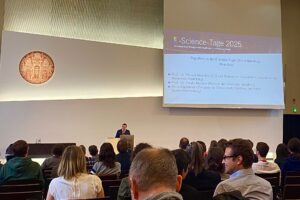
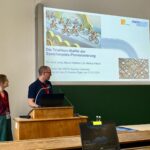
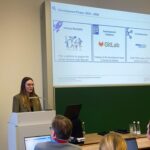
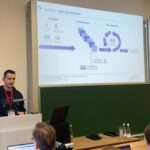


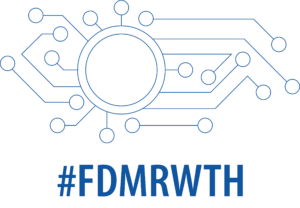
Leave a Reply
You must be logged in to post a comment.